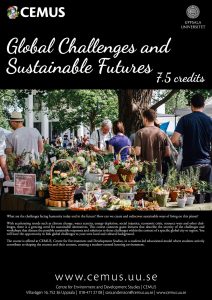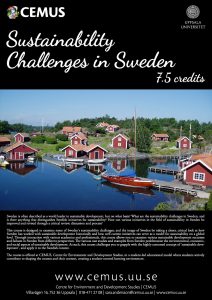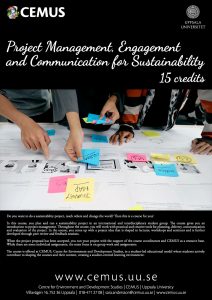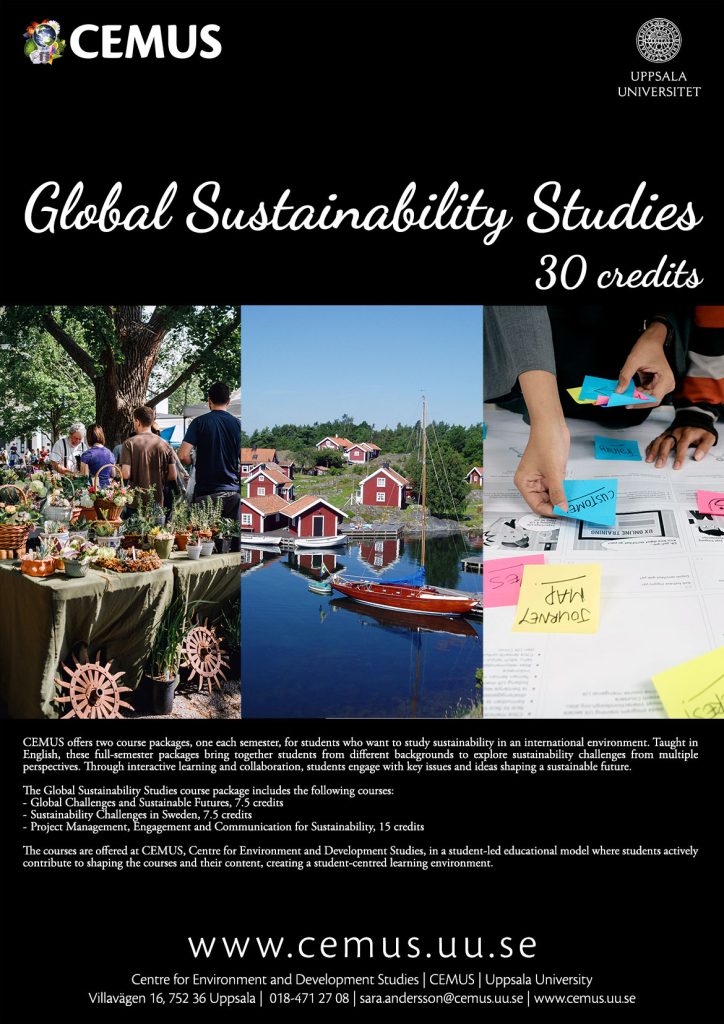We are happy to announce a new course package at CEMUS which gives you the opportunity to study full time in English autumn semester 2025! The package consists of three courses also offered as free-standing courses, read more below and apply no later than April 15, 2025.
Autumn 2025, 100%, On-campus, Mixed
Application at antagning.se »
Study period: 1 September 2025 – 18 January 2026
Application Deadline: 15 April 2025
Application code: UU-19601 Application
Language of Instruction: English
Location: Uppsala
Selection: Higher education credits (maximum 165 credits)
Entry Requirements: 60 credits
Fees: If you are not a citizen of a European Union (EU) or European Economic Area (EEA) country, or Switzerland, you are required to pay application and tuition fees. Read more about fees.
Application Fee: SEK 900
First tuition fee instalment: SEK 65,000
Total tuition fee: SEK 65,000
About the course package
This course package of 30 credits offers you the following courses:
Global Challenges and Sustainable Futures, 7.5 credits
 What are the challenges facing humanity today and in the future? How can we create and rediscover sustainable ways of living on this planet?
What are the challenges facing humanity today and in the future? How can we create and rediscover sustainable ways of living on this planet?
With accelerating trends such as climate change, water scarcity, energy depletion, social injustice, economic crisis, resource wars and other challenges, there is a growing need for sustainable alternatives. This course connects guest lectures that describe the severity of the challenges and workshops that discuss the possible sustainable responses and solutions to those challenges. You will have the opportunity to link global challenges to your own local and cultural background.
Sustainability Challenges in Sweden, 7.5 credits
 Sweden is often described as a world leader in sustainable development, but on what basis? What are the sustainability challenges in Sweden, and is there anything that distinguishes Swedish initiatives for sustainability? How can various initiatives in the field of sustainability in Sweden be improved and revised through a critical review, discussion and process?
Sweden is often described as a world leader in sustainable development, but on what basis? What are the sustainability challenges in Sweden, and is there anything that distinguishes Swedish initiatives for sustainability? How can various initiatives in the field of sustainability in Sweden be improved and revised through a critical review, discussion and process?
This course is designed to examine some of Sweden’s sustainability challenges, and the image of Sweden by taking a closer, critical look at how Sweden has worked with sustainable development historically and how well current initiatives can serve as a model for sustainability on a global level. Through interaction with various academics and professionals, this course allows you to examine various sustainable development successes and failures in Sweden from different perspectives. The various case studies and examples from Sweden problematise the environmental, economic, and social aspects of sustainable development. As such, this course challenges you to grapple with the highly contested concept of ‘sustainable development’, and apply it to the Swedish context.
Project Management, Engagement and Communication for Sustainability, 15 credits
 Do you want to do a sustainability project, reach others and change the world? Then this is a course for you!
Do you want to do a sustainability project, reach others and change the world? Then this is a course for you!
In this course, you plan and run a sustainability project in an international and interdisciplinary student group. The course gives you an introduction to project management. Throughout the course, you will work with practical and creative tools for planning, delivery, communication and evaluation of the project. In the course, you come up with a project idea that is shaped in lectures, workshops and seminars and is further developed through peer review and feedback sessions.
When the project proposal has been accepted, you run your project with the support of the course coordinators and CEMUS as a resource base. While there are some individual assignments, the main focus is on group work and assignments.
CEMUS offers two course packages with courses taught in English
CEMUS offers two course packages, one each semester, for students who want to study sustainability in an international environment. Taught in English, these full-semester packages bring together students from different backgrounds to explore sustainability challenges from multiple perspectives. Through interactive learning and collaboration, students engage with key issues and ideas shaping a sustainable future.
The courses are offered at CEMUS, Centre for Environment and Development Studies, in a student-led educational model where students actively contribute to shaping the courses and their content, creating a student-centred learning environment.

